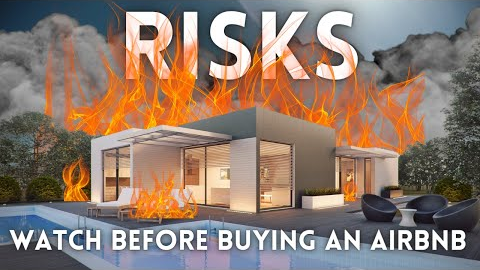NEVER Buy An Airbnb Property If You Don’t Know This!
236 View
Share this Video
- Publish Date:
- February 28, 2023
- Category:
- AirBnB Investing
- Video License
- Standard License
- Imported From:
- Youtube
Tags

#airbnb #str #realestate
There are 6 huge risks that can hurt your airbnb’s profitability. Make sure to watch until the end to hear the single greatest threat to your short term rental business and the best way to mitigate it. Now don’t get me wrong, Investing in a short term rental property CAN result in a lucrative cash flowing business. And there are plenty of airbnb evangelists here on youtube talking about how they're profiting thousands of dollars a month from their short term rentals. But you don’t hear a lot of people talking about the downsides of owning and operating an airbnb. And that’s what I’m about to get into.
So the first risk I’m covering is oversaturation of your Local short term rental market: Just because you’re able to command a high nightly rate now, doesn’t mean you’ll be able to in the future. Your property may be cash flowing like crazy because you don’t have a lot of competition in your area. But don’t assume that you’re the only one that’s aware of this lack of supply. Because other potential investors have access to your local rental income data through services like airDNA. And since a short term rental property’s income is subject to supply and demand just like any other business, if more airbnbs pop up in your neighborhood, you’ll have to drop your nightly rate to stay competitive.
The second risk to your bottom line is Property Damage: airbnb guests aren’t going to treat your property with the same care and respect as long-term tenants. And when something inevitably gets damaged, you end up losing a lot more money than you think. Because not only do you have to pay for the repairs to the damage done by your guests, you’ll also lose income if the property isn’t available to rent during the course of those repairs. So if you have a razor thin profit margin to begin with, a couple repairs can really wipe out any cash flow you might have been hoping for.
The third potential costly risk to your business is Liability Issues: I’m not a lawyer but if a guest is injured while on your property, you may be liable for their medical expenses. And if your rental property actually causes damage or injury to others or their property, you may also be liable for that. So you should definitely make sure that you have short term rental insurance to cover you in these situations, but even if you have the insurance policy to cover the liability, you’ll have a deductible that you’ll have to pay out of pocket and your premiums will also probably shoot up if you file a claim.
The fourth danger to be aware of is Revenue Fluctuations: Depending on the location of your property, short-term rental income can be highly seasonal and reactive to market fluctuations. For example if you own a beach house, you’re likely dependent on the peak revenue from the summer season to make up for the other 3 down seasons. So imagine in that case if something were to prevent you from renting your beach house during the summer, you’d lose out on the majority of your income for the entire year. So it’s important to identify and anticipate the season with lower income BEFORE you invest in a short term rental, and make sure that on average, your property will still be profitable over the course of an entire year.
The fifth risk that can cost you money is Reputation Damage from bad reviews: Negative reviews from guests can significantly lower your rating on airbnb or vrbo and make it difficult to attract future guests. This is especially critical when you’re starting out and you don’t have many reviews since 1 bad review can heavily skew your overall rating.
And that brings us to the most significant threat to your Airbnb business: the variability of local legal and regulatory rules. Your ability to operate your property as a short term rental can literally be shut down permanently if your local government decides it wants to outlaw short term rentals. So that means that even if you’ve already been operating a perfectly legal airbnb for years, your city can just decide one day that you’re not allowed to do that anymore. And if you don’t stop, they’ll slap you with some heavy fines and penalties so that you have no choice but to shut down. And it’s not like this is an unlikely scenario. There are countless examples of city after city banning short term rentals or at least placing a cap on the number of them allowed in a specific area. The best way to mitigate the dangers of owning an airbnb is to always make sure that any potential investment property can also cash-flow as a long term or medium term rental. So that in a worse case scenario where your local government bans short term rentals, you have a viable back option to generate cash flow. Now that probably means that you might have to work a little bit harder to find an opportunity that also works as a long term rental. But trust me it's worth having that margin of safety so that you don’t end up in a desperate situation where you’re losing money.















